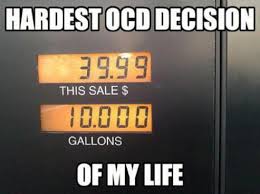You didn’t answer my question about treatment mate.
Sorry mate, meant to come back to it.
Treatment wise, psychotherapy/CBT are really the best options in my opinion. They're both talking therapies (CBT is a subset of psychotherapy) but have different scopes - CBT is more about "how do we get you functioning" whereas traditional psychotherapy such as psychoanalysis is more "how do we understand this issue". Both are available on the NHS and you can be referred by your GP (or you can self refer but the GP is the quicker route I hear). Therapy is so personal but I prefer the CBT approach in terms of impact.
OCD is often caused by Adverse Childhood Experiences or ACES. There is evidence that it runs in families but not they've not found the genetic component which suggests a learnt behaviour. I grew up in a household which lacked emotional warmth and was at times neglectful, with a high anxiety level pretty much always present, so my "baseline" anxiety was higher than it should have been. As most neuro-development is done in childhood, that's ultimately where most of the "damage" is done to mental health.
There is evidence about the usage of SSRIs such as sertraline and fluoxetine seeing a decrease in obsessive thoughts and it's not really understood why. They seem to think though that if you take too much of them then it goes the other way and makes it worse.
The therapy is essentially based on reprogramming yourself and understanding the condition a bit better. One of the things that I tried to stress in the article is that OCD is so frustrating because you know that you're mad but can't lessen anxiety without doing them. This only further trains your brain that your compulsions are required to solve your obsessive thoughts. And you can also obsess about your obsession so that's a fun trap.
Ultimately OCD is basically "thinking too much" and the treatment is learning not to think as much. Part of my treatment is to do spontaneous things. So for example, if I want to visit a friend who lives in Newcastle then as long as you have the time, go and do it. Don't make grandiose plans about trains or motorways or what such and such a person will do and how you need to clear it with everything - just go and do it. The idea here being that it sort of retrains you into understanding that compulsions are unnecessary and the obsessions are obsessions. It differs heavily from person to person but "exposure" seems to be the trend with it.
Honestly, the biggest thing that I gained from engaging with mental health is understanding myself better. When you're undiagnosed with OCD, or at least when I was, it was an incredibly lonely and miserable existence because you knew that you couldn't do certain things comfortably but you didn't understand why. You feel like the most pathetic loser who has ever existed. After I was diagnosed with it, I was able to look at a ton of incidents in my life and understand my reactions and thoughts much better - it wasn't because I was pathetic but because I had these obsessional thoughts that at times crippled me. Just knowing that you have a problem was a huge boost to my self esteem and mental state.
I will say that when going into CBT, you sort of have to audition each other. As OCD is an anxiety condition that often comes with depression, some focus heavily on "solving anxiety" which isn't really "solving OCD". You need to get someone who is focused on the OCD part rather than the anxiety part. You also shouldn't be encouraged to ignore your OCD or dwell on the reasons for it - this leads to steps backwards. The best analogy I was given was about being stood at the side of a busy motorway. The oncoming cars represent all of the obsessive thoughts and people with OCD tend to run into the middle of the road to start trying to direct traffic. Instead you should be allowing the cars to go past and fade off into the distance naturally. You acknowledge them coming, watch them go past and head off without affecting you.
As I'm a bit of a reader, my guy suggested reading
The Chimp Paradox to help me understand how the brain works. It's not a book focused on OCD but recognising the difference between the logical and emotional mind gave me a way to frame the issues a bit easier.

